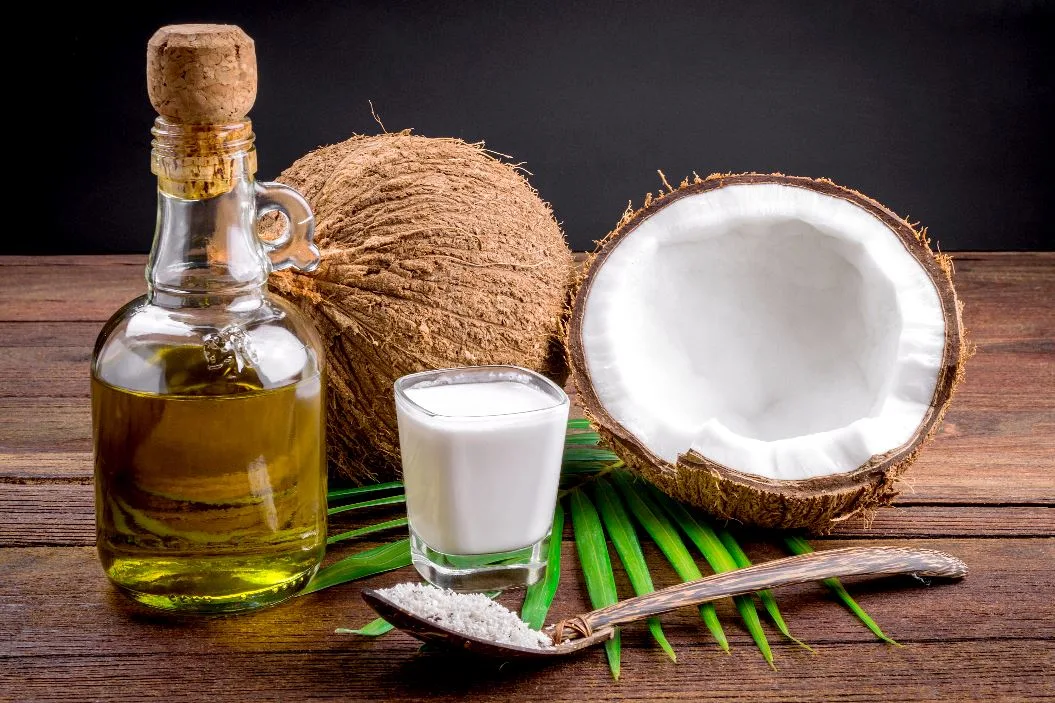The right cooking oil can help you stay healthy, and when it comes to choosing an oil, it often comes down to extra virgin olive oil (EVOO) and virgin coconut oil.
However, when it comes down to it, which of these oils is the healthiest of them all and which one of them should you leave in your pantry?
Extra Virgin Olive Oil vs Virgin Coconut Oil
1. Antioxidants
EVOO
Extra virgin olive oil contains antioxidants that have been linked to health benefits that include improved heart and diabetic health.
Coconut oil
Coconut oil does contain some antioxidants, but not to the same extent as olive oil.
2. Fat profile
Despite their nutritional stigma, we need fats as they play an essential role in the body. They not only help the body better absorb vitamins, but they also play an important role in brain as well as nerve function. 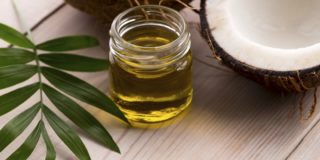
EVOO
EVOO is largely made up of unsaturated fats. Unsaturated fats are categorized as monounsaturated and polyunsaturated fats. Oleic acid is a monounsaturated fat found in EVOO that has been found to have anti-cancer effects whereas omega-3 and omega-6 fatty acids make up polyunsaturated fats.
Coconut oil
Coconut oil is mostly made out of saturated fat, and it is thought to be detrimental to one’s health.
Saturated fats have gotten a bad reputation due to their potential impact on cardiovascular health, yet research has shown that saturated fat contains antimicrobial properties. This is what makes coconut oil interesting.
3. Cholesterol levels
Cholesterol levels play a role when it comes to the development of chronic diseases such as cancer and diabetes. Therefore, it’s important to ensure that the foods you consume affect them positively.
EVOO
EVOO affects cholesterol in two ways.
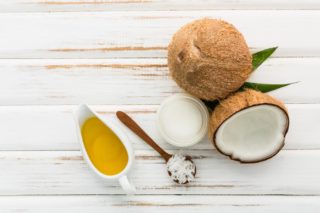
Firstly, it increases levels of good HDL cholesterol. Secondly, EVOO helps to reduce LDL-cholesterol and triglyceride levels, and in doing so, it helps to protect heart health.
Coconut oil
The saturated fat found in coconut oil increases levels of LDL cholesterol. That said, a 2018 study did find that coconut oil can raise HDL cholesterol when compared with butter and olive oil.
4. Heart Health
EVOO
EVOO is a staple in the Mediterranean diet, and this diet has been touted as one of the healthiest in the world due to its impact on heart health. The fats found in EVOO are heart-friendly, and they help to encourage cardiovascular health. They do this by lowering inflammation, regulating blood pressure, as well as improving cholesterol levels.
A study published in the Journal of the American College of Cardiology found that replacing margarine, butter, or mayonnaise with olive oil led to a reduced cardiovascular disease (CVD) risk.
Coconut oil
Interestingly, the Veddas are an isolated population in Sri Lanka who live in protected forests. Their diets largely consist of coconuts, fruits, yams, as well as wild game. In a study of 207 Veddas, not one case of heart disease was found. In fact, with the general Sri Lankan population, where the average person eats approximately 120 coconuts per year, heart disease is relatively uncommon (1).
With all that said, the American Heart Association still advises against the high consumption of saturated fats.
5. Weight management
EVOO
When it comes to fat burning and energy use, monounsaturated fats are readily burned as energy by the body and this can help with your weight management goals.
In fact, a Spanish study found an association between high olive oil intake and zero weight gain.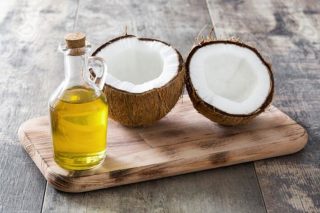
Coconut oil
Saturated fats are more readily stored in body fat cells. The body will first have to burn the newly introduced saturated fat before it gets to burning any of the already stored fat.
However, one should know that a 2011 study found that obese men who consumed 30 milliliters of virgin coconut oil per week decreased their waist circumference by an average of 2.86 cm.
6. Cooking
EVOO
EVOO can be used as a dip, in salad dressings, and even to sauté food at low to medium heat. While there are studies that suggest that using the oil at higher temperatures can release harmful compounds that have been linked to various diseases, Joseph R. Profaci, the executive director of the North American Olive Oil Association (NAOOA) does cite a study from the journal Acta Scientific Nutritional Health, where it was revealed that olive oil is not only safe to cook with at high temperatures, it’s one of the most stable and safest cooking oils available.
Coconut oil
Coconut oil can be used for baking as well as frying foods. Unfortunately, as it’s solid at room temperature, it can’t be used in dressings or marinades.
7. Skin
EVOO
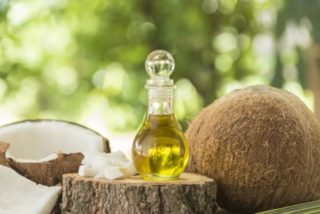 When it comes to skincare, the antioxidant value of EVOO makes it a great addition to our beauty arsenal. This is because the oil helps to protect the skin from the aging effects of free radicals.
When it comes to skincare, the antioxidant value of EVOO makes it a great addition to our beauty arsenal. This is because the oil helps to protect the skin from the aging effects of free radicals.
EVOO also helps you maintain healthy hair by moisturizing your scalp as well as improving blood circulation, which then promotes stronger hair follicles, and this results in thicker and healthier hair.
Coconut oil
Coconut oil can help moisturize the skin, and the anti-bacterial properties found in its saturated fat content can help to fight against acne and other harmful bacteria.
Additionally, coconut oil can stimulate hair growth as well as promote scalp health by fighting against dandruff as well as lice.
Our verdict
The winner is…extra virgin olive oil.
It’s rich in antioxidants, nutrients, and fats that help encourage longevity by protecting your health, and many studies continue to link reduced risks of heart disease, some cancers, diabetes, and more.
References
Athauda, L.K., Wichremasinghe, A.R., Kumarendran, B. and Kasturiratne, A., 2015. Ceylon Medical Journal, 60(3), pp.97–99. DOI: http://doi.org/10.4038/cmj.v60i3.8188
Guasch-Ferré, M., Liu, G., Li,Y., Sampson, L., et al. (2020). J Am Coll Cardiol, 75 (15) 1729-1739. https://www.onlinejacc.org/content/75/15/1729
Guillaume C., et al. (2018). Acta Scientific Nutritional Health 2.6, 02-11. https://actascientific.com/ASNH/pdf/ASNH-02-0083.pdf
Jiang, L., Wang, W., He, Q. et al. (2017). Sci Rep 7, 11277. https://doi.org/10.1038/s41598-017-11842-5
Khaw, K. T., Sharp, S. J., Finikarides, L., Afzal, I., Lentjes, M., Luben, R., & Forouhi, N. G. (2018). BMJ open, 8(3), e020167. https://doi.org/10.1136/bmjopen-2017-020167
Liau, K. M., Lee, Y. Y., Chen, C. K., & Rasool, A. H. (2011). ISRN pharmacology, 2011, 949686. https://doi.org/10.5402/2011/949686
Yoon, B. K., Jackman, J. A., Valle-González, E. R., & Cho, N. J. (2018). International journal of molecular sciences, 19(4), 1114. https://doi.org/10.3390/ijms19041114
